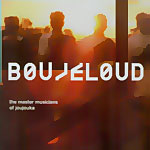It’s an oddity of information-sharing that within the indie music community, the Master Musicians of Joujouka are one of the best-known names in world music. It’s partially due to the fact that their music has been released not on "world music" labels but on respected indie labels such as Sub Rosa (perhaps better-known for modern works by Scelsi and Feldman, or electronica by Tone Rec and Scanner). But perhaps more than that, it goes back to how the Master Musicians originally came to the notice of western music listeners. In 1950, artist, author and bon vivant Brion Gysin operated a restaurant in Tangier, Morocco. He happened to hear the music of Joujouka, and was immediately obsessed by it. Local artist Mohamed Hamri took him to the village of Joujouka, where Gysin observed a tribal celebration known as the festival of Boujeloud, which Gysin believed to be derived from the ancient Rites of Pan. Gysin thereafter had the Master Musicians perform at his restaurant, and seemingly introduced them to every visitor to Tangier, including most notably William Burroughs and the Rolling Stones. Brian Jones was so taken by the music that he produced an album, Brian Jones Presents The Pipes Of Pan At Jajouka (1971). After years of silence, beginning in the 1990s (following the film of the Paul Bowles book The Sheltering Sky), a number of albums have been released, primarily by two different ensembles: one led by Bachir Attar and his father, the other led by Ahmed Attar. The latter released two albums on Sub Rosa in 1995 and 1996, and now 10 years later the third volume, Boujeloud, sees the light of day despite having been recorded by producer Frank Rynne between 1994 and 1996. As the title indicates, the recordings here are music for the festival of Boujeloud. As such, there are several versions of the title song, varying by instrumentation and participants from sparse flute (lira) to rhaita ensembles. While there are several versions of Boujeloud here, they differ enough to be considered different songs – although the album might work better as one long dive into the sound of the village of Joujouka. Often, the term "world music" is used to tag dumbed-down, spiritless versions of indigenous musics, carefully filtered to provide harmless, easy-listening background music. The Master Musicians are certainly not that: this is challenging stuff, trance-inducing yet filled with energy and adrenaline. This is music befitting a festival wherein the Father of Skins descends from the mountain to claim his bride, a celebration of fecundity, a harvest festival of endless dancing. It is not for background listening, and in fact is a music for which there is no easy place in western culture. It almost feels wrong not to dance while listening to Boujeloud, and, given the rarity of free-form celebration here in the west, it’s tempting to use this music as an excuse for a good urban frenzy. By Mason Jones
|
You can buy copies from the Master Musicians of Joujouka
website http://joujouka.net/4Store/
All proceeds go directly to the musicians.
There are 2 tracks on the Master Musicians Joujouka official MySpace
Jewash Halal / Tweka Miserisa 03.51
Mali Mal Hal M'Halmaz Everyone is Together 05.48
Master Musicians of Joujouka links
Official website
Master Musicians of Joujouka on Myspace
Ethical Shopping to buy Buy CDs and books Click Here

 View all articles by Mason Jones
View all articles by Mason Jones
No comments:
Post a Comment